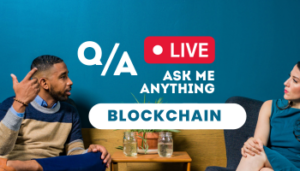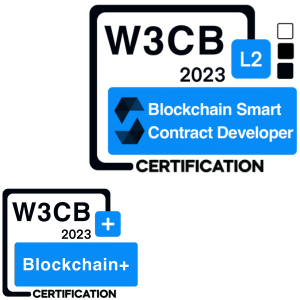Certified Blockchain Smart Contract Developer


Certified Blockchain Smart Contract Developer
Master the Art of Blockchain Contracts: Become a Certified Blockchain Smart Contract Developer
Immerse yourself in the intriguing world of blockchain smart contracts with our Blockchain Smart Contract Developer Program. This dynamic program includes eight on-demand courses and live instructor-led workshops, each meticulously designed to furnish you with a comprehensive understanding of blockchain smart contracts, their development, security, and applications.
Navigate through core concepts like blockchain scrum master, DevOps, zk-SNARKs, and more. Learn to write secure smart contracts using Solidity and enhance your practical understanding through live workshops. Gain deep insights into L1 & L2 Blockchains to round off your learning journey.
Courses in this Certificate Program
- 55 Total Hours
- OnDemand: 36 Hours
- LIVE Instructor: 19 Hours
- Tuition: $1,295
| Courses in this Program | Hours | Delivery Method |
|---|---|---|
| Student Orientation | 1 Hour | LIVE Online (optional) |
| LIVE Instructor AMA - bi-monthly | 1 Hour + | LIVE Online (optional) |
| Web3 Foundations | 3 Hours | OnDemand - Supported |
| Blockchain Foundations | 6 Hours | OnDemand - Supported |
| Bitcoin Intensive | 6 Hours | LIVE Online & Recording |
| Blockchain Development Decision | 5 Hours | LIVE Online & Recording |
| EXAM: W3CB BLOCKCHAIN+ CERTIFICATION | 1 Hour | AI Remote Proctored Exam |
| Introduction to Blockchain Scrum Master | 3 Hours | OnDemand - Supported |
| Introduction to DevOps | 3 Hours | LIVE Online |
| Understanding L1 & L2 Blockchains | 2 Hours | LIVE Online |
| zk-SNARKS Essentials | 2 Hours | OnDemand - Supported |
| Smart Contract Security | 7 Hours | OnDemand - Supported |
| Solidity Smart Contract Developer (EVM) | 7 Hours | OnDemand - Supported |
| Smart Contract Developer Workshop | 3 Hours | LIVE Online |
| EXAM: W3CB BLOCKCHAIN SMART CONTRACT DEVELOPER CERTIFICATION | 1 Hour | AI Proctored Online Exam |
Upcoming LIVE Instruction Dates
Instructor AMA Friday May 10 2024

Friday | 1 Hour | 2:00-3:00 PM EST (11:00 AM PT, 6:00 PM GMT) Attend LIVE to learn directly from...
May 10 @ 2:00 pm - 3:00 pmInstructor AMA Friday May 25 2024

Friday | 1 Hour | 2:00-3:00 PM EST (11:00 AM PT, 6:00 PM GMT) Attend LIVE to learn directly from...
May 24 @ 2:00 pm - 3:00 pm
Blockchain Smart Contract Developer Program Objectives
Understand the role and practices of a Blockchain Scrum Master.
Learn to make informed decisions in blockchain development.
Understand the role and benefits of DevOps in blockchain development.
Gain a comprehensive understanding of zk-SNARKs and their applications.
Master the fundamentals of smart contract security.
Learn to develop secure and efficient smart contracts using Solidity on EVM.
Gain hands-on experience in smart contract development through live workshops.
Understand the specifics of L1 & L2 Blockchains and their applications.
Learn to design and implement efficient blockchain strategies.
Stay updated on future advancements in smart contract development.
Certification from the Web3 Certification Board (W3CB)
Review Topic Areas and Exam Competencies on W3CB.org
Blockchain Smart Contract Developer Level 1 Certification
Exam Fee is included
Target Audience
Ideal for developers, blockchain enthusiasts, IT professionals, and anyone aspiring to build a career in Ethereum blockchain development using the Solidity programming language.
Prerequisites
This program is designed to accommodate both beginners and professionals, and the content will be delivered in a way that ensures every participant, regardless of their previous knowledge, can follow along.
The Ethereum Blockchain Developer Program requires a solid foundation in programming and the following technical prerequisites:
Programming Skills: A good understanding of at least one high-level programming language such as JavaScript, Python, or C++ is essential. Knowledge of JavaScript is particularly beneficial due to its similarity to Solidity, the primary language for Ethereum smart contract development.
Basic Blockchain Knowledge: While not a strict prerequisite, basic familiarity with blockchain concepts and principles can help learners grasp the course content more effectively.
Web Development Basics: Understanding of web development basics, including HTML, CSS, and JavaScript, is important, as these are often used to build the front end of decentralized applications (DApps).
Knowledge of Node.js and npm: A basic understanding of Node.js and npm (node package manager) is useful for managing dependencies and packages in Ethereum development.
Git and GitHub: Knowledge of version control systems, particularly Git, and an understanding of how to use GitHub to manage and share your code is also a valuable skill for developers.
Questions Explored:
How does a Scrum Master role fit into the blockchain development process?
What factors influence the decision-making process in blockchain development?
How does DevOps integrate with blockchain and smart contract development?
What are zk-SNARKS and how do they contribute to blockchain privacy and security?
How can one ensure the security of smart contracts?
How can Solidity be leveraged for effective smart contract development on Ethereum (EVM)?
How can live workshops contribute to the practical understanding of smart contract development?
What are the characteristics and differences between L1 & L2 Blockchains?
How does smart contract development align with overall blockchain architecture and strategies?
What are the possible future advancements and research areas in smart contract development?
Blockchain Smart Contract Developer Program Content
Web3 Foundations
Module 1: Understanding what Web3 is
Module 2: Why Web3
Module 3: Web3 and the Metaverse
Module 4: Blockchain Fundamentals
Module 5: Understanding DeFi
Module 6: Challenges, Risks and Ethics of Web3
Module 7: What comes after Web3?
Blockchain Foundations
Module 1: Blockchain Background and Basics
Module 2: Different Types of Blockchains
Module 3: Consensus
Module 4: Cryptography and Hashing
Module 5: Smart Contracts
Module 6: Blockchain Wallets
Module 7: Pros and Cons
Module 8: Public Blockchain-Based Applications
Module 9: Blockchain and Crypto Regulation
Module 10: Regulatory Reporting
Module 11: Distributed Autonomous Organizations
Module 12: Blockchain Today
Module 13: The Trilemma
Blockchain & Bitcoin Intensive
Module 1: Bitcoin Overview
Module 2: Technical Limitations & Mining Introduction
Module 3: Mining
Module 4: Bitcoin vs Protocols 2.0, 3.0, 4.0…etc.
Module 5: The New Database
Module 6: Payments, Voting and other Use Cases
Module 7: What’s next?
Blockchain Development Decision
Module 1 – Development Essentials
Module 2 – Platforms
Module 3 – Hosting and Mining Decisions
Module 4 – Associated Technologies
Module 5 – Development Languages
Module 6 – Security and Implementation Goals
Module 7 – Risk Management
Module 8 – Digital Transformation & Summary
Introduction to Blockchain Scrum Master
Module 1: Introduction to Blockchain Scrum Master
Module 2: Agile Economics, Managing, Options, Myths and Benefits
Module 3: Scrum Master Role, Scrum Roles, Teams, Basics
Module 4: Iteration Basics and Elements
Module 5: Blockchain Elements Leadership
Introduction to DevOps
Module 1: Introduction to DevOps
Module 2: The DevOps Lifecycle
Module 3: Popular DevOps Tools
Module 4: DevOps Team Structure and Roles
Module 5: DevOps and ITIL
Module 6: Implementing DevOps: Best Practices and Challenges
Module 7: DevOps Culture and Collaboration
Module 8: DevOps in the Future
zk-SNAKRS Essentials
Module 1: Introduction to Zk-SNARKs
Module 2: Technical details of Zk-SNARKs
Module 3: Building a Zk-SNARK application
Module 4: Future developments and research in Zk-SNARKs
Solidity Smart Contract Developer (EVM)
Module 1: First Smart Contract
Module 2: Adding Functionality
Module 3: User Addresses
Module 4: Update State Conditions
Module 5: Payments Introduction
Module 6: Sending Crypto to an address
Module 7: Conditional Transfer
Module 8: ERC-20 Development Options to create fungible tokens
Module 9: ERC-721 Development Options to create non fungible tokens
Module 10: Smart Contract Voting
Module 11: Demo a DApp (Decentralized Application)
Smart Contract Security
Module 1: Intro to Smart Contract Security
Module 2: General Programming Vulnerabilities
Module 3: Blockchain Vulnerabilities
Module 4: Ethereum-Specific Vulnerabilities
Module 1: Introduction
Module 2: Layer 1 Blockchains
Module 3: Layer 2 Blockchains
Module 4: Use Cases
Module 5: Technical Aspects
Module 6: Conclusion
Module 7: Layer 0 and Layer 3 blockchains
Program Information
- Dates: Rolling Enrollment
- Location: OnDemand & LIVE Online
- Tuition: $1,295
- Tuition Assistance
- 55 Total Hours
Additional Information
- Module Quizzes and Knowledge Checks
- Guest Lectures & Networking
- Student Orientation
- LIVE Online Instructor AMAs
- LIVE Workshops
- 2 EXAM VOUCHER – W3CB CERTIFICATIONS
Certification Competencies

The material covered in this course contributes to 100% of the Focus Areas as defined in the Web3 Certification Association (W3CB) Exam Competencies for two AI Proctored Certification Exams:
Blockchain+ Certification Exam
Blockchain Smart Contract Developer Certification

Alternative Technical Track
BLOCKCHAIN SECURITY PROFESSIONAL
- Web3 Foundations
- Blockchain Foundations
- Blockchain & Bitcoin Intensive
- Development Decision
- Exam Voucher: W3CB Web3+ Certification
- Introduction to DevOps
- Key Management
- Blockchain Security
- Smart Contract Security
- Information Security and Cyber Risk Awareness
- Risk Management for Blockchain-Based Technology Companies
- Understanding L1 and L2 Blockchains
- Exam Voucher: W3CB Blockchain Security Professional Certification
Alternative Non-Technical Track
AI PROMPT ENGINEER CAREER TRACK
- AI Essentials
- Web3 Foundations
- Blockchain Foundations
- Blockchain & Bitcoin Intensive
- Exam Voucher: W3CB Web3+ Certification
- Prompt Engineering 101: AI Chat Bot (ChatGPT)
- AI Prompt Engineering 201: Advanced Topics
- AI Prompt Engineering 301: Developer Topics
- Mastering Image Generative AI
- Mastering Music Generative AI
- Exam Voucher: W3CB AI Prompt Engineer Certification
